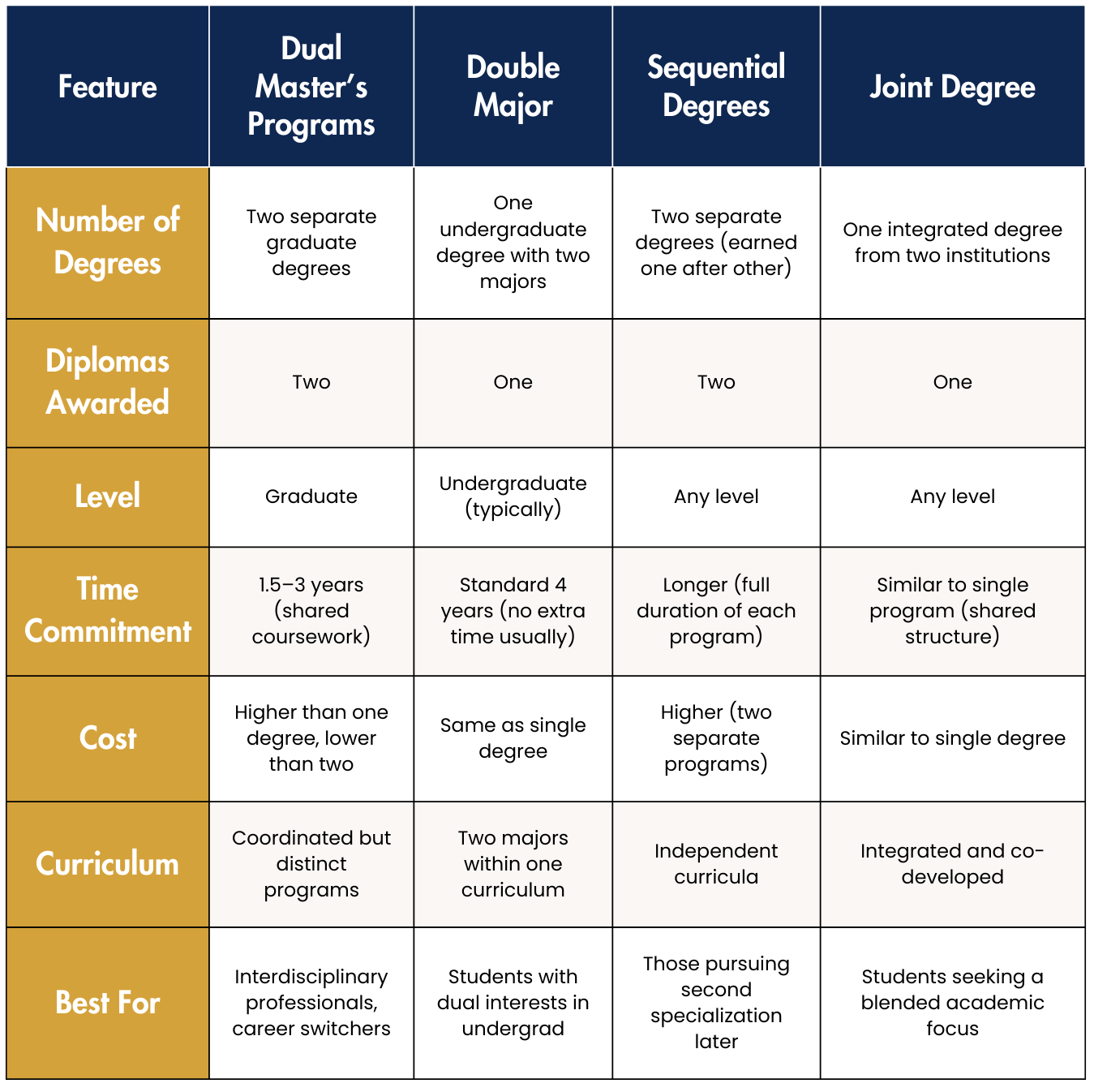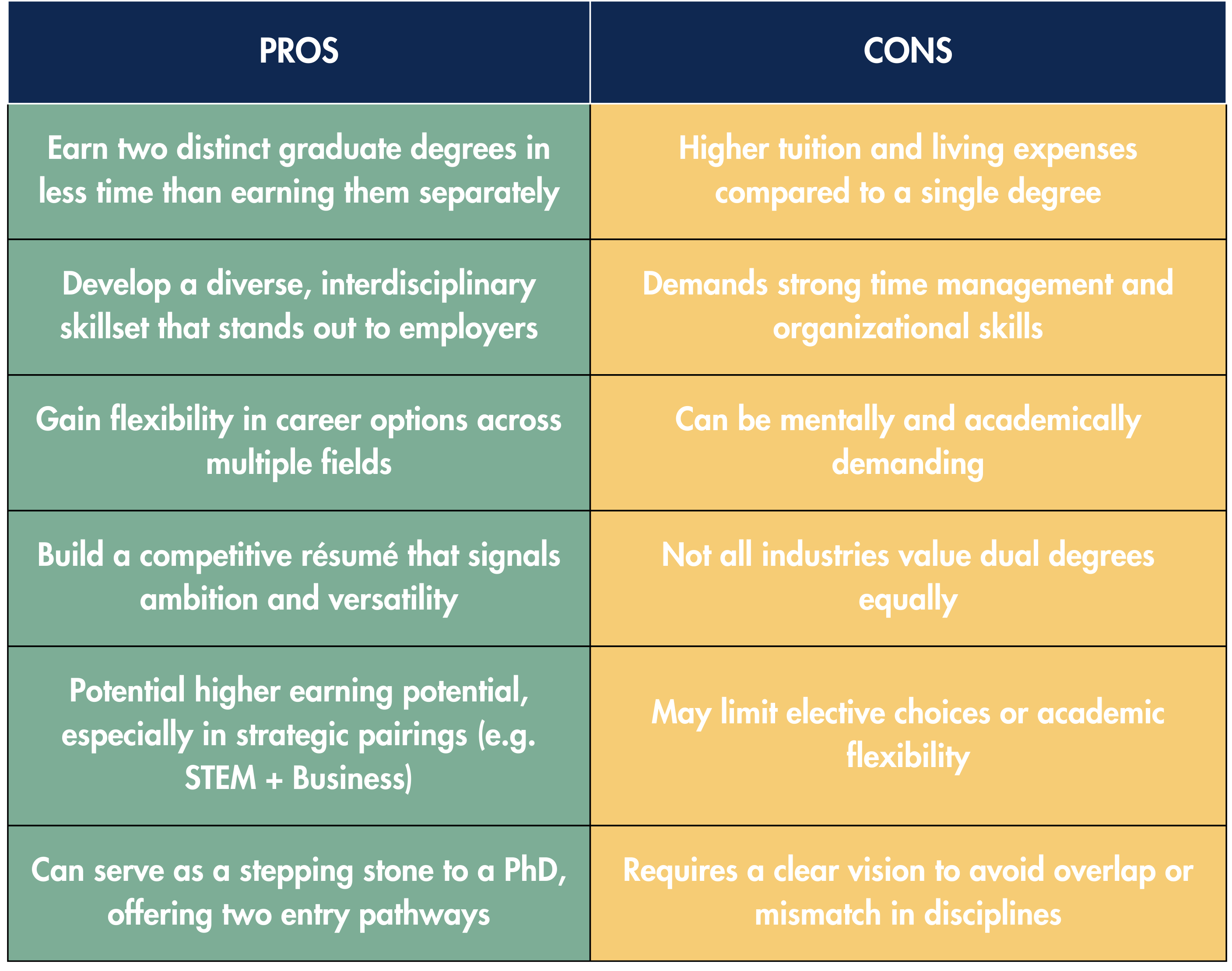Table of Contents
- What exactly is a dual master program?
- Benefits of Pursuing a Dual Master Program
- Challenges to Consider Before Enrolling
- Who Should Consider a Dual Master Program?
- Dual Master Program vs. PhD: Which One Is Better?
- Is a Dual Master Program Worth It in the End?
- FAQ: Frequently Asked Questions About Dual Master Programs
- 1. Is a dual master program worth the extra time and cost?
- 2. Can I do a PhD after a dual master program?
- 3. How do I choose the right degree combination for a dual master program?
- 4. Is a dual master program harder than doing two degrees separately?
- 5. Do employers actually care if I have two master’s degrees?
What exactly is a dual master program?
A dual master program allows you to earn two separate master’s degrees simultaneously, typically in related or complementary fields. Unlike sequential degrees where you complete one program after another, dual degrees are structured to overlap and save time, often through partnerships between universities or departments within the same university.
They can be pursued within the same institution or through a joint program between institutions in different countries. With the right approach, it’s a smart way to deepen your expertise and broaden your career options.
In an increasingly competitive global job market, students and professionals alike are looking for ways to stand out. One path that’s gaining popularity is a dual master program. But what exactly is it, and is it really worth the extra time, cost, and effort?
Dual Master program vs. Other Degree Types: What’s the Difference?
It’s easy to confuse a dual master’s program with other types of academic programs, so let’s clarify a few key distinctions:
Dual Master Program:
You earn two separate graduate degrees—typically in related or complementary fields—at the same time. These programs are structured for efficiency, often sharing coursework and shortening the total time compared to pursuing each degree separately.
Double Major
Common at the undergraduate level, a double major allows you to study two disciplines within a single degree program. You graduate with one diploma that lists both majors.
➕ In some education systems, especially internationally, double majors can occasionally be structured as dual bachelor’s degrees—but this depends on the university’s curriculum and faculty structure.
Sequential Degrees
This path involves earning one degree first, then enrolling in a second program later. While flexible, it generally takes more time and tuition than a structured dual degree.
Joint Degree
In a joint degree, two institutions (or departments) collaborate on a single integrated curriculum, and you graduate with one combined diploma. This is different from a dual degree, where you receive two distinct diplomas.
Benefits of Pursuing a Dual Master Program
There’s no denying that earning two master’s degrees is an ambitious goal. But the rewards can be substantial.
1. Broader Knowledge and Interdisciplinary Expertise
Dual master programs allow you to go deep in two fields instead of one. Whether you’re interested in blending Law and Public Health, or pairing Data Science with Business, you’ll graduate with a broader understanding and a more versatile skillset.
This kind of interdisciplinary training is increasingly valued by employers, especially in fields that intersect, like technology and management, or sustainability and policy.
2. Competitive Edge in the Job Market
In a pool of applicants with traditional credentials, a dual master program signals commitment, adaptability, and high-level competence. It can open doors to niche roles and leadership tracks that favor professionals with cross-functional expertise.
According to recent studies, candidates with dual qualifications—particularly in combinations like STEM and Business—tend to earn higher starting salaries and are more likely to hold managerial roles early in their careers.
3. Time and Cost Savings (Compared to Two Separate Degrees)
Although a dual master program is typically more demanding than a single program, it’s also more efficient. Instead of enrolling in two separate programs (which could take four or more years combined), you complete both degrees concurrently in a shorter time frame.
This can translate to lower tuition overall and less time spent out of the workforce—an important financial consideration for many students.
4. Broader Perspectives and Real-World Application
Dual master programs are designed to bridge two distinct fields—giving you a more holistic perspective on complex, real-world challenges. By studying two disciplines side by side, you’ll learn to think across boundaries, connect ideas, and solve problems from multiple angles.
Whether you’re combining technology and policy, business and data science, or any other pairing, this kind of cross-functional training reflects how modern industries actually work—collaborative, interdisciplinary, and constantly evolving.
Challenges to Consider Before Enrolling
Of course, pursuing a dual master program is not for everyone. Here are a few challenges to weigh carefully before committing:
1. Intensive Workload and Time Commitment
You’ll be covering the core requirements of two programs, which means more courses, more projects, and more exams. Balancing two academic tracks can be mentally and emotionally demanding, even for highly motivated students.
Strong time management, organization, and stress resilience are essential to succeed.
2. Higher Upfront Costs
While a dual master program can save money compared to two standalone programs, it still tends to cost more than a single master’s. Tuition, travel, and living expenses (especially for international programs) can add up quickly.
Be sure to research scholarships, grants, or tuition discounts that may be available specifically for dual degree candidates.
3. Limited Flexibility
Because these programs are tightly structured, you may have less freedom to explore electives or switch tracks. If you’re still unsure about your long-term goals or academic interests, a dual degree may feel restrictive rather than empowering.
Who Should Consider a Dual Master Program?
While a dual master program isn’t the right path for everyone, it can be a powerful choice for students who want more than a traditional, single-track education.
This path is especially appealing to:
-
Passionate learners who find themselves equally drawn to two different fields and don’t want to choose just one. A dual degree allows you to explore both interests in depth and discover how they intersect in meaningful ways.
-
Strategic planners who already know exactly how two disciplines can work together to support their long-term goals. Whether it’s combining data science and business, or engineering and management, a dual degree can sharpen your edge in a very intentional direction.
✅ Request information on BAU's programs TODAY!
-
Career switchers looking to pivot into a new industry while leveraging their existing background.
-
Ambitious professionals aiming for leadership roles that require interdisciplinary fluency and a broader skillset.
-
Entrepreneurial thinkers who want to merge creative, technical, or analytical expertise to build something of their own.
If you’re intellectually curious, career-driven, and motivated to bridge two areas of expertise, a dual master program offers the flexibility, depth, and momentum to make it happen.
Dual Master Program vs. PhD: Which One Is Better?
That depends entirely on your career goals.
If your ambition is to become a researcher, academic, or subject matter expert, a PhD may be the better route. It offers deep specialization and prepares you for a career in research, university teaching, or high-level policy work.
On the other hand, a dual master program provides practical, cross-disciplinary training that can be more applicable to roles in the private sector, public administration, or entrepreneurship. It’s ideal for those who want broad, applied knowledge rather than narrow academic specialization.
That said, the two paths aren’t mutually exclusive. Students can pursue a dual master program first, then continue to a PhD—often selecting one of their two fields as a research focus. This approach gives you a strong, flexible foundation and helps clarify your academic direction before committing to a long-term doctoral program.
Is a Dual Master Program Worth It in the End?
Let’s bring it back to the big question: is a dual master program worth it?
For many, the answer is a resounding yes—especially if the fields are thoughtfully chosen, the program is well-structured, and your goals are clear. You gain academic depth, professional versatility, and a competitive edge that few others can match.
Still, it’s a big commitment. Before enrolling, take time to reflect on your motivations, talk to alumni, and understand the full scope of what the program entails.
FAQ: Frequently Asked Questions About Dual Master Programs
1. Is a dual master program worth the extra time and cost?
It can be, depending on your goals. If you’re someone who thrives in interdisciplinary environments, wants to stand out in a competitive job market, or needs expertise in two fields to reach your dream role, the added investment in a dual master program can pay off—both professionally and personally. That said, it’s important to weigh the return on investment in your specific industries of interest. In high-demand areas like tech, business, policy, or health, the payoff is often significant.
2. Can I do a PhD after a dual master program?
Yes—many students do. In fact, one of the benefits of earning a dual master is the flexibility it gives you to specialize later. You can pursue a PhD in either of the fields you studied, or even in an area that intersects both. This is especially helpful if you’re still exploring your academic direction or want to keep multiple doors open for the future.
3. How do I choose the right degree combination for a dual master program?
Start with your career goals. Ask yourself: Where do I want to be in 5–10 years? What industries or roles excite me? Then, identify the skillsets or knowledge areas you need to get there. Great combinations are often found where two fields intersect to create high value—like Data Science + MBA, or Business + Design. If you’re passionate about both subjects and see how they complement each other, that’s a strong sign you’re on the right path.
4. Is a dual master program harder than doing two degrees separately?
Not necessarily harder—but definitely more intense. A dual master program condenses two programs into a shorter timeline, which means you’ll be juggling a heavier workload and tighter deadlines. However, most structured programs are designed with overlapping courses or integrated tracks to help make it manageable. If you’re organized, self-motivated, and enjoy a challenge, it’s a highly efficient path.
5. Do employers actually care if I have two master’s degrees?
Yes—especially if your degrees are relevant to the job. Employers value dual master program graduates for their versatility, problem-solving ability, and cross-functional thinking. In fields where interdisciplinary knowledge is a strength (e.g., consulting, tech, policy, healthcare, or management), having two master’s degrees can set you apart and even lead to faster career advancement.














